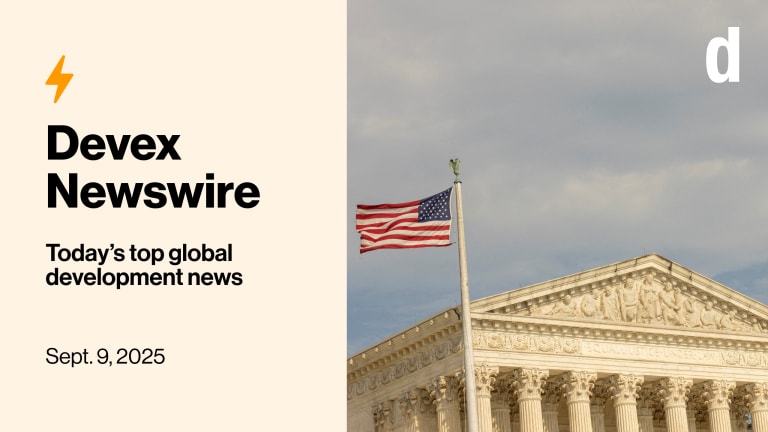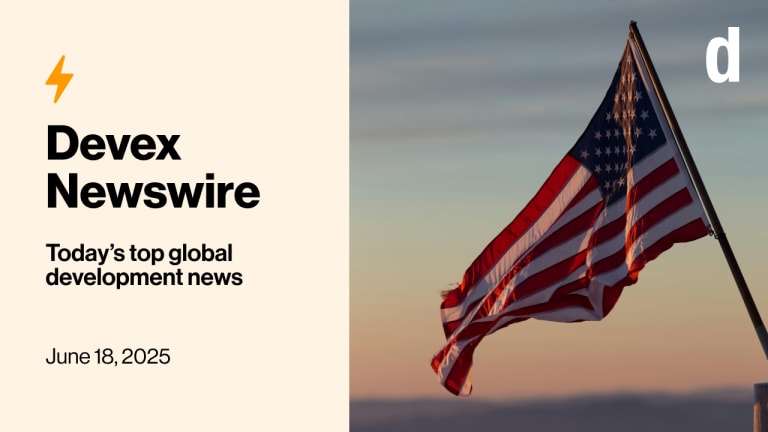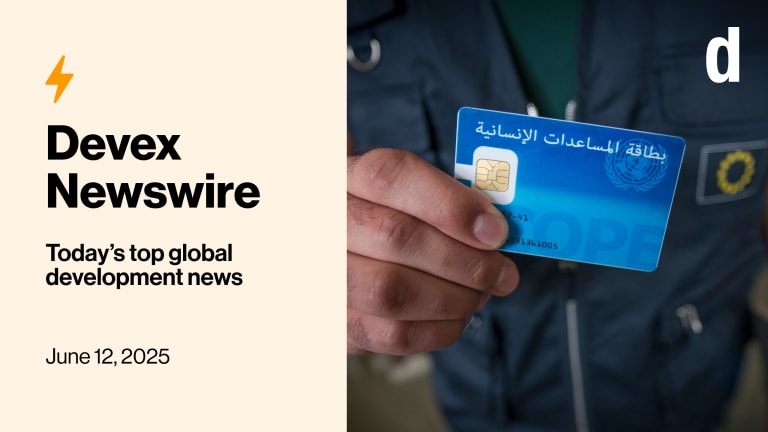
The selection of U.S. Sen. Marco Rubio as the next secretary of state has inspired cautious optimism for U.S. aid, as he supports global engagement — when it serves national interests. But insiders worry his focus on security could sideline development programs.
Also in today’s edition: We bring you reporting from COP29 and the Paris Peace Forum.
Question Marco
With Sen. Marco Rubio as U.S. President-elect Donald Trump’s pick for secretary of state, U.S. aid advocates may be breathing a cautious sigh of relief. Known for backing global engagement — and keeping an eye on where every dollar goes — Rubio seems to believe in foreign aid. That is, as long as it’s serving U.S. interests.
This is a preview of Newswire
Sign up to this newsletter for an inside look at the biggest stories in global development, in your inbox daily.
Insiders call him “the best of the worst” for development, so while it’s not a guaranteed win for aid programs, it’s a lot better than they feared, write my colleagues Adva Saldinger and Michael Igoe.
Rubio’s track record shows he’s no stranger to the world of foreign aid: He’s pushed for transparency, diversified partnerships, and even cosponsored bills like the Foreign Aid Transparency and Accountability Act to make sure aid dollars go where they’re supposed to. Plus, his focus on keeping America strong globally means he’s not against a little soft power when it supports U.S. interests.
But one Republican lobbyist says Rubio might not fight tooth and nail to protect aid from internal shake-ups. His main priority? Keeping aid tightly connected to U.S. security, especially in countering influences like China and Russia. In a 2017 speech, Rubio explained his stance: U.S. global engagement and foreign aid are “critical” because if the U.S. steps back, adversarial powers like China, Russia, North Korea, and Iran could step in, leading to a less stable, more dangerous world.
Read: ‘We can work with him’ — aid advocates react to Trump's Rubio pick
+ Catch up on the latest updates following the 2024 U.S. elections.
Stomp and circumstance
Devex climate reporter Jesse Chase-Lubitz is still in Baku, Azerbaijan, reporting on the whirlwind of the United Nations Climate Change Conference, COP29. The first iteration of the deal on the new collective quantified goal, or NCQG, has been published — spoiler alert: Not everyone is happy about it — and Brazil has made some big promises about cutting emissions and switching to ethanol.
Speaking of people not being happy, Jesse says protests are expected today — though they won’t include any stomping, at the request of organizers concerned about the venue’s structural integrity. Tragically, the original plan to incorporate giant Pikachu suits has apparently been postponed. Check out our COP29 reporter’s notebook for all her thoughts and observations from the third day of the conference.
Read Jesse’s latest entry: Behind the scenes at COP29
Background reading: COP29 is the ‘finance COP.’ Here's what that means (Pro)
+ A Devex Pro membership helps sustain the journalism we’re able to bring you. Not yet gone Pro? Start your 15-day free trial today to access all our expert analyses, insider insights, funding data, exclusive events and career resources, and more. Check out all the exclusive content available to you.
Thinking fast and slow
Is it better to tinker around the edges or tear down a failing system and start fresh? No, this isn’t the U.S. election debate — it’s the lively showdown on how to bridge the global “North-South Gap” that took center stage at the Paris Peace Forum.
In the Team Gradualism corner, Rebeca Grynspan, the secretary-general of U.N. Trade and Development and former Costa Rican vice president, argued that Africa’s abundant critical minerals represent “a huge opportunity to supercharge growth and development.” Sure, there are challenges — mainly the urgent need to diversify “commodity-dependent” economies, currently shunned by the private sector as too “high risk.” But Grynspan was undeterred, asserting, “This is possible. We need the multilateral banks to lower the risk.”
In the opposite corner was Youba Sokona, chair of the African Institute for Sustainable Energy and System Analysis, championing the rip-it-up approach. Sokona bluntly declared that the notion of closing the gap is “the wrong agenda” — a global north-driven agenda that keeps Africa from charting its own course. He pointed out the $60 billion in hydrogen investments flowing into Africa, with 90% exported, while less than half of Africans have access to electricity. His take? “It’s not for the continent. We need a completely different approach.”
The Paris Peace Forum, under the theme “Wanted: A Functioning Global Order,” brought together conversations on Ukraine, the Middle East, global finances, and even how to elect a female U.N. secretary-general (two contenders — Grynspan and María Fernanda Espinosa — were seen in the hallways making the rounds).
And in a quirky twist, many of these sessions were held in the same room, thanks to the “silent forum” setup, my colleague Rob Merrick tells me. With mandatory headsets for all, speakers murmured into their microphones as listeners tuned in through their headphones — a perfect way to keep folks off their phones and truly listening.
ICYMI: Gates Foundation CEO urges action to repair global north-south schism
‘Small is beautiful’
Anne Bouverot, France’s special envoy for artificial intelligence, is on a mission to make next February’s Artificial Intelligence Action Summit a lot less one-size-fits-all and a whole lot more inclusive.
“We need to enable a route for the development of AI which is a different route to the current route of the ‘bigger is better’ paradigm,” she declared at the Paris Peace Forum on Monday.
With massive AI models like those from OpenAI gobbling up data, energy, and computing power, only a few deep-pocketed companies in wealthier nations can afford to play in this space. But Bouverot wants to shake things up, creating an AI ecosystem where smaller nations don’t just use AI — they help build it.
As for the mega models that try to answer everything under the sun? They come with a hefty carbon footprint and concentrate power among the few, my colleague Catherine Cheney tells me. That’s why Bouverot is hoping the summit kick-starts a new AI foundation focused on supporting open-source, right-sized models. Picture AI that’s smaller, more tailored, and globally accessible — with a lighter environmental impact to boot.
“We don't need to have huge energy, hungry models for everyone,” she said. “We need to have targeted, small models to cater to specific needs for specific countries, specific communities, specific industry sectors, specific SDGs. We really need to go for the small applications. Small is beautiful.”
Related reading: Who will control the internet? (Pro)
And don’t miss: What is the Global Digital Compact and why does it matter?
Horrors of war
“The drones would come down and pick off civilians, children,” said professor Nizam Mamode, a transplant surgery specialist, the pain etched on his face as he recounted the horrors of working at Nasser Hospital in southern Gaza, treating the victims of Israel’s military offensive triggered by Hamas’ Oct. 7, 2023, attack.
“Day after day after day, operating on children who would say, ‘I was lying on the ground after a bomb had dropped, and this quadcopter came down, and hovered over me, and shot me.’ That's clearly a deliberate act,” he told the U.K. Parliament’s International Development Committee.
The stunned faces of the members of Parliament — listening to a well-spoken, immaculately dressed professor laying out his conviction that Israel is routinely targeting and killing injured children — showed that terrible testimony from Gaza still has the power to shock, Rob tells me.
Mamode calmly explained why the drone’s pellets are “more destructive than bullets,” because they “bounce around” inside a body — leaving a 7-year-old boy with “his stomach hanging out of his chest,” alongside injuries to the liver, spleen, bowel and arteries, for example.
He added: “We saw a number of children with sniper injuries to the head, single shot to the head, no other injuries — so clearly, deliberately targeted by Israeli snipers.”
Strikingly, Mamode was shocked that the MPs were shocked, pointing out that scores of medics have written to U.S. President Joe Biden and U.K. Prime Minister Keir Starmer with similar revelations, saying: “This is not a surprise — it’s something senior politicians are aware of.”
ICYMI: Bombardments delay child polio vaccine campaign in Gaza
+ Catch up on our coverage of the humanitarian crisis in Gaza.
In other news
More than 28 million people are now in need of humanitarian aid in Sudan, as fighting between warring parties persists. [Xinhua]
Nearly half a billion people living with diabetes around the world have no access to lifesaving treatment, according to the Lancet. [The Telegraph]
Two patients died after a Médecins Sans Frontières ambulance carrying them was attacked in Haiti. [BBC]
Sign up to Newswire for an inside look at the biggest stories in global development.








